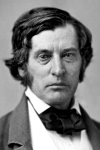Prologue, Parts 1, 2, 3; Full text
Andrew Butler, that “Heroic knight! Exalted Senator! A second Moses come for a second exodus!” always had a good word for his mistress, the harlot Slavery. Charles Sumner would not let the Senate soon forget that. There among them sat a man happy to defend the practice of selling children at auction. Many others did the same, but not all of them both played an important supporting role in repealing the Missouri Compromise and remained in the Senate for Sumner to castigate. Like some of those others, Butler had laid into Sumner. Sumner hit back:
the Senator, in the unrestrained chivalry of his nature, has undertaken to apply opprobrious words to those who differ from him on this floor.
That opprobrium included calling Sumner and company sectional fanatics. Standing against the theft of Kansas by proslavery fraud made for “an uncalculating fanaticism.” Sumner damned the attacks as untrue and unoriginal and turned them back on Butler, painting him as the ardent sectionalist and returning to his theme of freedom national. Butler’s “too great a perversion of terms” could not stand.
Many pages and a day later, Sumner returned to Butler again. The Senator, while absent then from the Senate, remained,
omnipresent in this debate, overflowed with rage at the simple suggestion that Kansas had applied for admission as a State; and, with incoherent phrases, discharged the loose expectoration of his speech […] The Senator touches nothing which he does not disfigure-with error, sometimes of principle, sometimes of fact. He shows an incapacity of accuracy, whether in stating the Constitution or in stating the law […] He cannot open his mouth, but out there flies a blunder
On the face of it, Sumner insulted Butler in no more unusual a manner than he would anyone else. One can easily imagine him indicting Franklin Pierce or Daniel Webster with similar words. Sumner’s “loose expectoration” remark would, strictly speaking, fit anybody speaking incautiously. Andrew Butler suffered from partial facial paralysis, which gave him a speech impediment. Disability, not rage or fanaticism, afflicted the Senator’s oratory.
Many historians believe that Sumner drew the assault on his person that would come shortly with those words. Calling attention to a man’s disability attacked him in a way that indicting his politics did not. Sketching him as a bumbling fool and making the disability a centerpiece of that portrayal made it all the worse. Nineteenth century Americans didn’t have our scruples about mocking the unfortunate, but Sumner probably still exceeded the bounds of good taste by a wide margin. Often politicians could flay one another viciously and then kick back for a few drinks after Congress let out. Sometimes they even delighted in the insults they threw back and forth as a kind of game. Butler and Sumner’s friendship likely had some of that element to it, at least at the start. Maybe it could have again, but Butler died in 1857 and Sumner remained largely absent from Washington for the next few years.


You must be logged in to post a comment.